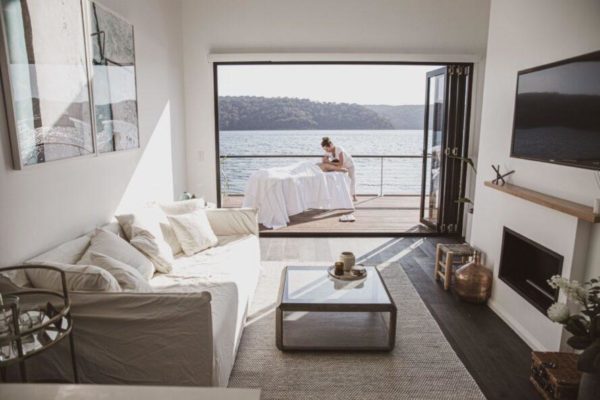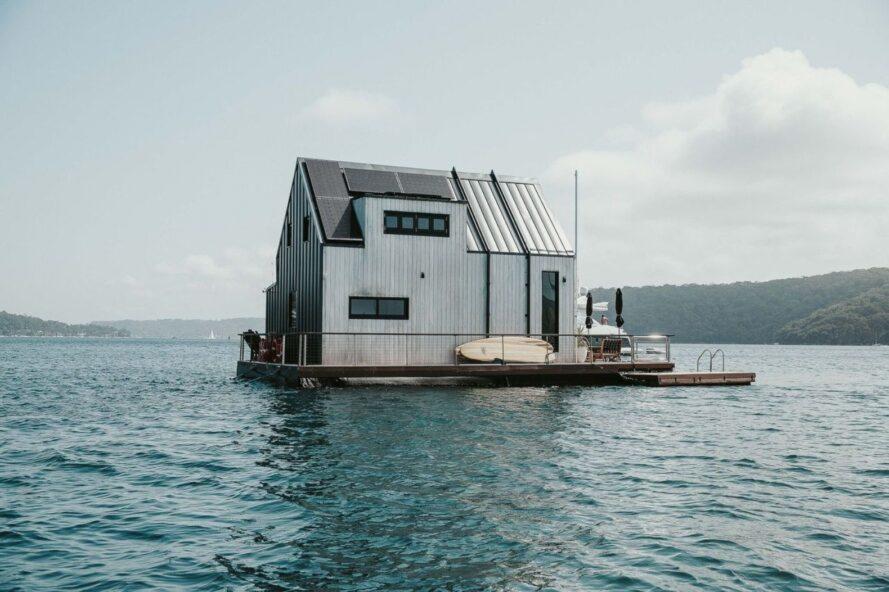It’s a sensation we’ve all experienced, floating leisurely on the ocean surface with the sun warming our skin and painting our eyelids coral coloured; but who among us hasn’t thought, at that very moment: “This is wonderful, but it would be even better if I had a villa.” Well, Australian architect Chuck Anderson heard what the people want and built the Lilypad, a solar-powered floating villa bobbing just off Sydney’s Palm Beach.
The Lilypad is 100% solar-powered, a design feature targeted from day one. “Growing up on Sydney’s Northern Beaches and spending much of my life around boats, I always had a vision to create something truly special that people can now enjoy as their own,” Anderson told euronews. “Lilypad Palm Beach certainly brings new meaning to the phrase self-sufficient.”
The people of Sydney camp as close to the sides of the Harbour or ocean as they can, that’s why we’re called Sydneysiders. But if there is one thing better than living on the water’s surrounds, it must be living surrounded by water, like the Lilypad. It’s the island life for me.
Of course, no man is an island, but few of us would turn one down. If you’re like me you don’t need much in life, only the very best; and luxury doesn’t come much better than the Lilypad. However, what truly sets this island apart is not amenities, massages, or aquamarine quietude, but that the Lilypad offers the rarest kind of pleasure, a sustainable one. The villa’s solar power ensures that amongst pleasures the Lilypad is an island unto itself, an indulgence at libety from guilt. After all, forbidden fruits may be sweet, but they’re also commonplace, and where’s the luxury in that?
“Lilypad is certainly one-of-a-kind,” Anderson told Design Files. “Completely powered by solar, it has no fuels on-board, yet luxury and function are not compromised one bit.”
https://www.instagram.com/p/B05PyhMg7bm/
Sustainable Tourism – Islands in the Solar Stream
Around the world, exotic and frankly under threat destinations are turning to renewable energies to alleviate their dependency on fossil fuels and ensure they can provide what their guests so desire – peace of mind.
Last year, Singapore-based Canopy Power completed two solar PV microgrid projects on the private Indonesian island resorts of Nikoi and Cempedak, reducing the diesel fuel consumption of the islands by 50%. In Mauritius, a 20 kWp solar and energy storage system has fully substituted diesel-based power generation for the resort island of Ile des Deux Cocos. And back in Australia, World Heritage-listed Lord Howe Island is on the verge of beginning a new sustainable life through the installation of a long-awaited solar and energy storage system.
Of course, these are just a few secluded examples, which shouldn’t blind us to the real potential of solar PV for the world’s islands. With the maturity of Australia’s rooftop solar industry, many are recognising the sea of opportunity in Southeast Asia’s 658 million people clamouring for access to electricity. Indeed, Australian startup Okra Solar has been working tirelessly in Cambodia and the Philippines to help provide solar microgrids to remote and island communities. Okra is hoping to eradicate energy poverty and leapfrogging fossil fuels at the same time.
Obviously, many islands and remote communities are reliant on imported diesel fuels, an insecure and unsustainable footing as Malalison, a small island in the Philippines, recognised. Malalison subsequently inaugurated a pilot project seeking to supply the islanders with solar energy round the clock and it now features a 50 kW PV system coupled with a 273 kWh lithium-ion battery.
It’s the Island Life for Me
The Lilypad comes with its own private tender for access to private beaches, gourmet food, an on-board wine cellar, proximity to attentive staff and anything else you could possibly want under the sun, and indeed, provided for by the sun.

Image: The Lilypad Palm Beach
The Lilypad is available for overnight stays, a casual AUD$1,850 and solar-powered luxury is yours, all-inclusive, including peace of mind.
This content is protected by copyright and may not be reused. If you want to cooperate with us and would like to reuse some of our content, please contact: editors@pv-magazine.com.









3 comments
By submitting this form you agree to pv magazine using your data for the purposes of publishing your comment.
Your personal data will only be disclosed or otherwise transmitted to third parties for the purposes of spam filtering or if this is necessary for technical maintenance of the website. Any other transfer to third parties will not take place unless this is justified on the basis of applicable data protection regulations or if pv magazine is legally obliged to do so.
You may revoke this consent at any time with effect for the future, in which case your personal data will be deleted immediately. Otherwise, your data will be deleted if pv magazine has processed your request or the purpose of data storage is fulfilled.
Further information on data privacy can be found in our Data Protection Policy.